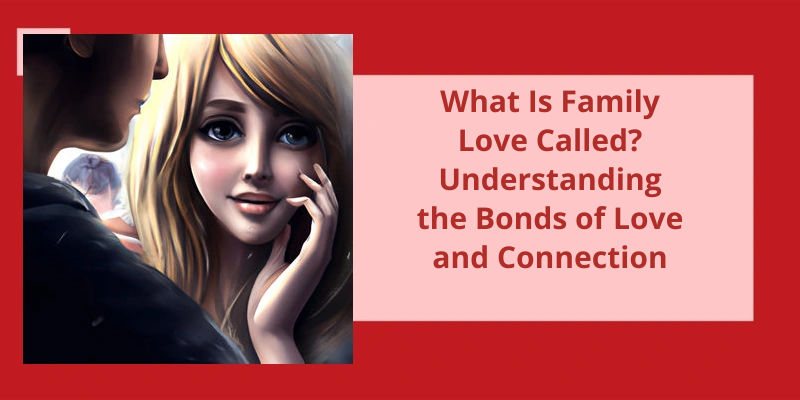Family is an integral part of our lives, shaping our personalities, values, and beliefs. From the moment we’re born, we’re surrounded by our family members, who provide us with support, guidance, and love. This bond of family love is known as storge. It’s a unique type of love that stems from the deep-seated affection and connection that we share with our family. While storge entails a range of emotions, including compassion, respect, and loyalty, it’s core essence lies in the strong sense of kinship and belonging that it fosters.
What Is the Meaning of Family Love?
Family love is unconditional and forgiving. It’s a bond that exists despite disagreements or conflicts. Even when you disagree with a family member or have a misunderstanding, you know that they’ll always be there for you. Family love is a safe haven where you can go for comfort and support. It’s a bond that’s built over time through shared experiences, traditions and values.
The meaning of family love transcends all boundaries of time and space. It’s a love that can exist between family members even when they aren’t physically together. For example, when a family member moves away for work or school, the love that exists between them doesn’t fade away. It continues to grow and flourish through phone calls, text messages, and visits.
The rewards of family love are immeasurable. It’s a love that gives you a sense of belonging, purpose, and identity. It gives you a support system that will be there for you through thick and thin. It’s a love that will push you to be your best self and to work towards your goals and dreams.
It’s a support system that pushes you to be your best self and to work towards your goals and dreams.
How Different Cultures Express Family Love
- Collective decision making in African families as a way of expressing love and unity
- Korean culture emphasizes on respect for elders as a way of expressing love for family members
- Filipino culture has close-knit extended families as a way of expressing love and support
- Indian culture values family traditions and bonds as a way of expressing love and respect
- American culture encourages open communication and sharing activities as a way of expressing love and affection
- Chinese culture emphasizes on filial piety and respecting parents as a way of expressing love and gratitude
- Mexican culture values family gatherings and celebrations as a way of expressing love and appreciation
- Japanese culture emphasizes on selflessness and putting family needs before individual needs as a way of expressing love and devotion
As a fundamental unit of society, the idea of family has constantly evolved throughout history. However, for most people, family is a crucial aspect of their lives, representing a group of individuals they hold dear and care for deeply. From the unconditional love to the support and inspiration, there’s no denying that family plays a significant role in shaping the person we become. But, what exactly does a family symbolize? In this article, we will explore the different meanings and perceptions of family across various cultures and societies.
What Does a Family Symbolize?
Family symbolizes so much more than just blood relations or legal ties. Family is a bond that’s formed through love, support, and commitment, and it’s one of the strongest bonds that we can have in our lives. A family provides us with a sense of belonging, security, and comfort, and it gives us a foundation upon which we can build our lives. It’s a place where we can be ourselves and feel loved and accepted for who we are.
Of course, families can also be complicated and messy at times. There may be tension or conflict between family members, and there may be issues that need to be resolved. But even in these moments, a family symbolizes the power of forgiveness, understanding, and compassion. It’s a place where we can learn to communicate and work through problems, and it’s a place where we can grow and learn from our mistakes.
But at it’s core, it represents the power of love, commitment, and connection. It’s a reminder that we’re all part of something greater than ourselves, and that we’ve a responsibility to care for and support one another. Whether we’re born into a family or we create one through our own choices, we all have the opportunity to experience the joys and challenges of this powerful bond.
Source: What things symbolize your family and why?..
Storge, also known as familial love, is a special kind of love that exists between family members. It’s a bond that’s reinforced by not only genetic ties, but childhood memories and familiarity as well. Unlike philia, which is primarily focused on friendship, storge is specific to the relationships between parents and their children, siblings, and other immediate family members.
What Is the Name for Family Love?
Storge is a deep, unconditional love that’s often described as the foundation of all relationships. It’s a natural form of love that’s cultivated through shared experiences, laughter, tears, and struggles. Storge is what holds families together in the midst of lifes challenges and triumphs.
The importance of storge love can’t be overstated. It’s a love that’s essential for human beings to thrive, especially in the early parts of life. It helps children feel secure, loved, and valued, which is critical for their emotional, cognitive, and social development. Children who grow up in families that are strong in storge love are more likely to be resilient, adaptable, and empathetic.
Even as adults, we continue to rely on storge love to sustain us through lifes ups and downs. As we experience loss, illness, or other challenges, we turn to our families for comfort and support. We draw strength from the knowledge that we’re loved unconditionally, and that no matter what happens, our families will be there for us.
Of course, storge love isn’t always perfect. Families can be sources of stress, conflict, and hurt. Sometimes, storge love can be tested by disagreements, misunderstandings, or even distance. However, the beauty of storge love is it’s enduring nature. Even when we’re hurt or angry, we still love our family members deep down. We may need time and space to heal and reconnect, but ultimately, storge love prevails.
In many cultures, storge love is celebrated through traditions and rituals that honor family ties. Family reunions, holiday gatherings, and ancestral pilgrimages are just a few examples of the ways in which people show their appreciation for family love. These occasions help strengthen relationships and deepen bonds that may have weakened over time.
It’s important for teenagers to understand the complexity of love and how it varies in different types of relationships. The distinctions between family love and couple love are important to explore, as they’ve unique qualities and influence how individuals navigate various relationships. In order to have a healthy and fulfilling life, it’s vital to understand these differences and learn how to navigate them appropriately.
What Is the Difference Between Family Love and Couple Love?
Family love is a type of love that comes naturally to most people. It’s the kind of love that you feel for your parents, siblings, and extended family members. This kind of love is unconditional, meaning that it doesn’t depend on your actions or behavior. No matter what happens or how upset you might make your parents or siblings, theyll always love you. It’s a comforting feeling to know that you’ve this kind of love and support from your family members.
In contrast, couple love, or romantic love, is usually based on attraction and desire. It’s passionate and intense, and it requires effort and maintenance to stay strong. You might not always agree with your partner, and you might have disagreements or conflicts, but you work through them together because your love is important to both of you.
While family love is typically unconditional, romantic love can be conditional. There are certain things that must be present in a healthy romantic relationship, like trust, respect, honesty, and communication. Without these important factors, romantic love can suffer, and relationships can break down. It’s important for your teen to recognize the importance of these factors in a romantic relationship.
Long-term relationships often involve a combination of family love and romantic love. As couples grow and mature together, their relationship becomes more like family. They support each other unconditionally, like family members, but they also maintain the passion and attraction that drew them together in the beginning. This combination of love is what helps a long-term relationship stay strong and healthy.
The Greek language has a rich history, and with it comes a multitude of words for different types of love. One of the most notable is “erotas,” which refers to the intimate, passionate love between two individuals. This concept has been explored in depth by philosophers such as Plato, who introduced the idea that eros isn’t just a physical desire, but a deeper appreciation for the inner beauty of a person or thing. In this article, we will delve further into the meaning behind this fascinating word, and explore it’s cultural significance.
What Is the Most Intimate Greek Word for Love?
This understanding of love reflects the deep philosophy of Ancient Greece, which saw love as a complex and multi-layered emotion. Ancient Greek literature and art are filled with depictions of love, from the passionate embraces of gods and mortals to the quiet intimacy of close friends. As such, the Greek language is filled with words for love, each with their own nuance and feeling.
One of the most well-known Greek words for love is “philia”, which means friendship or affection. This type of love is often described as non-romantic and non-sexual, but still deeply meaningful. In fact, some would argue that friendship is the truest form of love, as it doesn’t rely on physical attraction or fleeting emotions.
Another important Greek word for love is “storge”, which means familial love or affection. This type of love is often found between parents and children, siblings, or other family members. It’s a love that’s unconditional and ever-present, and forms the foundation of many of our closest relationships.
Of course, no discussion of Greek love would be complete without mentioning “agape”. This type of love is often described as selfless, unconditional, and all-encompassing. It’s often linked with spiritual or religious concepts, and is seen as a type of love that transcends human boundaries.
But perhaps the most intimate Greek word for love is “eros”. As mentioned earlier, this type of love is often associated with physical and sexual desire. However, it also has a deeper, more philosophical meaning that speaks to the beauty and complexity of human relationships. When we experience eros, we’re moved by the inherent beauty and goodness that we see in another person, and are drawn to them on a deeper level.
This word captures the complex and multi-layered nature of love, and speaks to the beauty and depth of human relationships. Whether we’re experiencing the love of a friend, a family member, or a romantic partner, eros reminds us of the power and importance of human connection.
The Historical and Cultural Significance of Each Greek Word for Love, Including Their Origins and Usage in Ancient Greek Literature and Philosophy.
- Agape – Unconditional love, selfless love for all of humanity, originating from the Christian tradition.
- Eros – Romantic love, lustful passion, desire and sexual love, originating from the mythological god of love, Eros.
- Philia – Friendship or affectionate love, the type of love felt between friends or family members, originating from the Greek word for “friendship”.
- Storge – Familial love or affection, the love between family members, such as parents and children or siblings, originating from the Greek word “storgē”, meaning “natural affection”.
- Pragma – Enduring love, long-standing or long-term love, the love that develops between partners who’ve been together for a long time or have grown to love each other over time, originating from the Greek word for “enduring love”.
- Philautia – Self-love, the love of oneself or self-respect, originating from the Greek word “philautia”, meaning “love of self”.
- Ludus – Playful or flirty love, the type of love experienced in the early stages of a romantic relationship or during casual, non-committed relationships, originating from the Latin word for “game”.
- Pragma – Enduring love, long-standing or long-term love, the love that develops between partners who’ve been together for a long time or have grown to love each other over time, originating from the Greek word for “enduring love”.
Conclusion
Whether it’s parents and children, siblings, or extended family members, storge is a powerful force that provides a sense of belonging, security, and connection that’s unique to each family unit. While challenging at times, the love shared within families is an integral part of what makes life meaningful and fulfilling, and is something that we should cherish and nurture throughout our lives.






